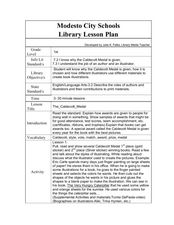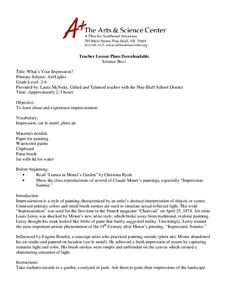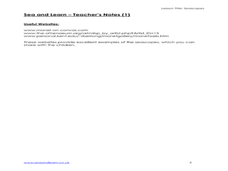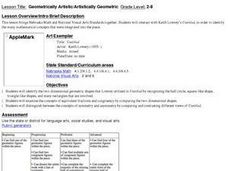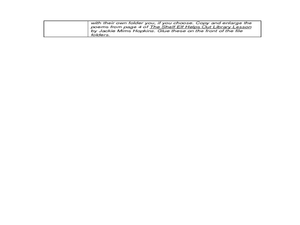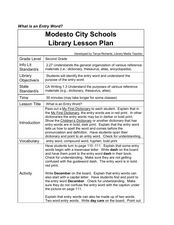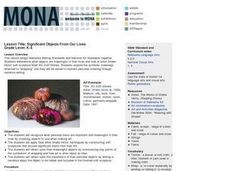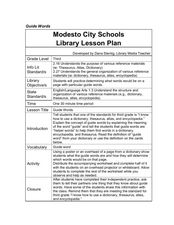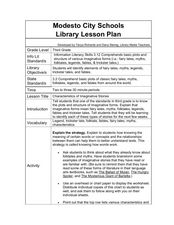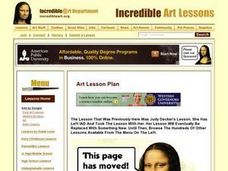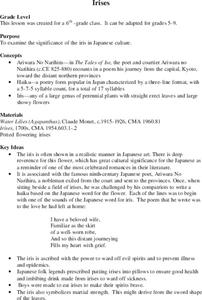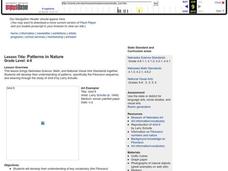Curated OER
Determining Author's Point of View: The Sneeches
Determine the author's point of view in a text. Young readers read Dr. Seuss' The Sneeches and identify the author's purpose in the story. They identify persuasive techniques in writing, asking and answering questions to better...
Curated OER
Painted Shoes
Students recreate great works of art on old shoes in this exciting art lesson for grades K-8. Emphasis is placed upon the work of Canadian artist Theodore Dragonieri and examples of paintings created by "the Masters" (including VanGogh,...
Curated OER
Stewart's Boxes
Learners collect memorabilia and create shadow boxes in the style of David Stewart. They also compose a poem and explain their identity in an oral presentation. This is a rare lesson that works quite well for a variety of age levels.
Curated OER
Authors and Illustrators: What do they do?
Help readers understand the roles of authors and illustrators and why they have been recognized by medals of excellence. Your class will discuss and then create illustrations for a book. When they have finished, you can hold your own...
Curated OER
Library Lesson Plan
Explain the differences between fiction and non-fiction and the characteristics of a biography. Learners analyze three pieces of literature on the same topic to determine which is fiction and which is non-fiction. In the end, relate the...
Curated OER
Lesson Plans for Drawing
Students analyze Impressionist art and complete related activities. In this Impressionist art lesson plan, students read and study the art of Childe Hassam. Students explore basic design concepts and the steps in drawing. Students...
Curated OER
Painting/technology "and You Were There!"
Eighth graders study Impressionism through the works of Claude Monet. They do a self portrait in the Impressionist style.
Curated OER
What's Your Impression?
Young scholars paint landscapes. In this Impressionism lesson, students explore the history behind the Impressionist Movement in art and paint their own impressionist piece inspired by a nearby landscape.
Curated OER
Seascapes
Young scholars discover the watercolor techniques used by Monet and create their own "seascapes" in this Visual Art lesson for the elementary classroom. Emphasis is placed on using various brushstrokes and paint application methods.
Curated OER
Geometrically Artistic/Artistically Geomtric
Students identify the two-dimensional geometric shapes Lowrey utilized in the painting Untitled. Students compare the two-dimensional shapes in terms of equivalent fractions, congruency, symmetry and asymmetry. Students create their own...
Curated OER
A House is a House for Me: Library Skills for Young Readers
Read Mary Ann Hoberman's book A House is a House for Me to introduce the idea that a library is a house for shelves of books. Young readers practice alphabetizing in the picture book (easy fiction) section of the library. They learn how...
Curated OER
Library Skills: Biography
Biographies deserve special attention when training youngsters how to use the library because they are alphabetized by subject rather than by author. Guide children through the process of finding biographies over a two-visit series. On...
Curated OER
Book Jacket Match: Practice with the Dewey Decimal Classification System
As a follow-up activity to being introduced to the Dewey Decimal Classification System, 3rd graders listen to poems from Jackie Mims Hopkins' book The Shelf Elf Helps Out and sort book jackets by category and call number.
Curated OER
Dictionary Work - Entry Words
Second graders examine the use of entry words in the dictionary. In this dictionary use lesson, learners look at guide words in a children's dictionary as the teacher/librarian describes the characteristics of each entry. They complete...
Curated OER
Significant Objects From Our Lives
Students determine what objects are meaningful in their lives and look at artist Sheila Hicks' soft sculpture titled Six Soft Stones. Students explore the symbolic meanings attached to the art form of "wrapping" and wrap a meaningful...
Curated OER
Adventure Into The World of Shapes
Young scholars view Elmer Holtzrichter's work Mystery Planet and discuss basic shapes and patterns. They create their own collage. and discuss the patterning they created. Students demonstrate how this pattern would sound with clapping...
Curated OER
Guide Words
Third graders investigate guide words. In this library lesson, 3rd graders investigate guide words in reference materials and complete an alphabetizing worksheet.
Curated OER
Characteristics of Imaginative Stories
Third graders explore genre characteristics. In this genre literacy lesson, 3rd graders listen to a variety of fiction stories and classify them according to genre. Students identify common features in each genre and complete a chart by...
Curated OER
Watercolor Collage
Sixth graders study about Impressionism and Post Impressionism. They create a watercolor collage.
Curated OER
How Do you Feel?
Students discover how moods and perceptions can be affected by colors. As a class, they create their own color wheel and identify primary and secondary colors. They draw their own cool and warm color mosaic and discuss how each one of...
Curated OER
Irises
Students create realistic and impressionistic drawings of irises in an attempt to better understand the importance of the iris in Japanese culture and art. Lesson extensions are provided for this one day lesson.
Curated OER
Constitution and the Bill of Rights
Fourth graders explore the information of the index of the Constitution. In this Constitution and Bill of Rights lesson, 4th graders complete a worksheet by locating keywords in the index. Students understand the importance of using an...
Curated OER
Documenting Where We Are
Learners contribute to discussions and identify how an artist elicits a viewer's response. They use William Henry Jackson's Pawnee Indian Village, photograph and painting. After analyzing this information, students use information gained...
Curated OER
Patterns in Nature
Students learn about artist Larry Schulte and view examples of his work. They create addition sentence for the first seven numbers of the fibonacci sequence and use unifix cubes to build that sentences. Students color and create three...
Other popular searches
- Claude Monet Art Projects
- Monet Art Lessons
- Art by Claude Monet
- Art Monet
- Claude Monet Art Lessons
- Monet Elementary Art Lessons
- Monet Art Projects
- Grade 4 Art Monet
- Monet Art Bridge
- Claude Monet Art
- Watercolor Art Monet
- Monet Art "Monet





